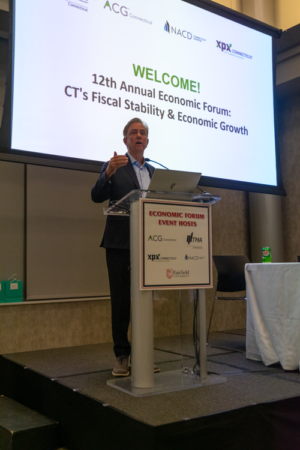Gov. Lamont readies himself for his next term

“I was really fortunate to have a great first boss when I was at Cablevision Systems, and his name was Charles F. Dolan,” said Gov. Ned Lamont in his keynote speech for the 12th Annual Economic Forum at Fairfield University’s Charles F. Dolan School of Business.
Addressing a gathering of business leaders and alumni, the governor stated how he was introduced to the rapidly evolving world of television by the business leader for whom the school is named. The idea of having 54 channels to fill at the time had seemed challenging, but Lamont recalled how Dolan pointed to a magazine rack, with dozens of specialist publications publishing deep dives on their own topics as the model television could pursue.
Many years and television channels later, Lamont now found himself addressing a collection of business leaders shortly after winning a second term as Connecticut’s governor.
“I can tell you one reason I was running is that Connecticut used to be the most entrepreneurial state in the country,” Lamont said, pointing to various businesses that were founded in the state such as Pratt & Whitney or Sikorsky Aircraft as examples of that entrepreneurial past before “we lost some of our entrepreneurial mojo. For 30, 40 years we did not add one new net job to this state and that created a cycle of fiscal crises.”
Lamont reiterated the core plank in his campaign platform, that upon taking office in 2019 Connecticut had a $2 billion budget deficit that has since been replaced with a $6 billion surplus. He also observed that upon taking office many major companies with corporate campuses were decamping from the state, adding that his efforts to keep the state open during the pandemic to draw back many employers and employees.
“Instead of having a battle this last campaign about deficits and what you cut and what you don’t cut we were having a debate about surpluses,” he observed. “That doesn’t happen very often in the state.”
He also told the audience that his business background has made him appreciate his current role.
“I want to say that governor is a pretty cool job. I hate the idea of going down to Washington, D.C. and taking orders from Chuck Schumer or Mitch McConnell ”” just shoot me,” Lamont said, stating he found an executive role to be a better fit for him than dealing with legislative politics.
Building off the strength of the state’s Rainy Day Fund and reduced pension debt, Lamont pointed to what he viewed as bright spots in the economy. Stamford has grown into a fintech center, the formerly empty UBS offices are now entirely leased, and Yale University is producing life sciences and pharmaceutical research, which he described as far more important than contributions to the humanities. He wished that more computer science work was available in the state but declared Connecticut the “Silicon Valley of manufacturing.”
F-35 components, military and civilian helicopters from Sikorsky, and submarines produced at Electric Boat were all seeing booming production, which Lamont defined as a sign of the state’s potential economic strength.
“I’m glad you guys are all here, not down in Delray, Florida,” Lamont quipped, saying that Connecticut’s future needs to be secured by ensuring it has the country’s best-trained and most-productive workforce. He contrasted his job with Gov. Ron DeSantis of Florida who “just gets to tax sunshine for tourists.”
Lamont fielded questions from the audience about infrastructure and education, noting there was room for improvement on both but expressing confidence in the state’s ability to make headway. In regard to a question on traffic, he noted that four or five bridges along I-95 are responsible for a considerable amount of the slowdown and said that within the next five-to-six years constituents can expect to see real progress.
One audience member asked how dependent the state is on Fairfield County and the members of the financial services industry who live there.
“To be blunt, we’re very dependent on very high incomes,” Lamont replied, emphasizing the importance of increasing the overall size of the tax base, particularly with middle class taxpayers to reduce the volatility in state income compared to sales tax.
Lamont also spoke about “getting his ass kicked” on the issue of tolls. Lamont said he wound up installing a “highway user fee,” which captures revenue from out of state trucking without requiring a tollbooth.
Also discussed was the estate tax, which Lamont claimed played a larger role in driving the “uber wealthy” from the state more than income tax.
“Politically it’s tough because we have got more income disparity in this state than just about anywhere in the country, so for me to say I’m just going to eliminate it is not viable. But I’ll tell you what I did do. We raised the exemption from $1 million to $20 million, so that meant for 95% of people, we got rid of the estate tax,” he said.